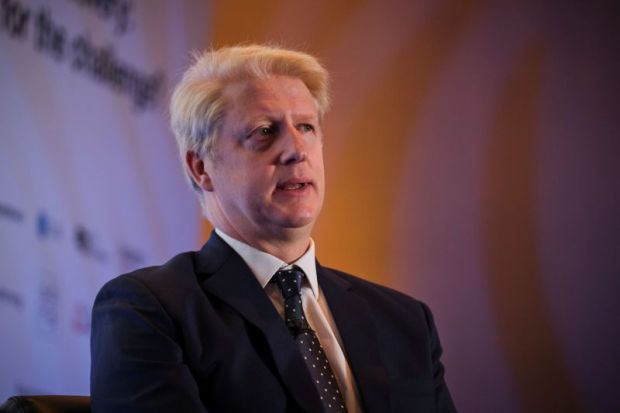The Westminster government should consider requiring English universities that are considered to be over-reliant on Chinese student fees for their funding to take out insurance policies, former universities minister Lord Johnson of Marylebone said.
Speaking at Times Higher Education’s THE Campus Live event, Lord Johnson said the sector regulator, the Office for Students, “should think about requiring institutions to explore insurance policies if they’re not prepared to diversify their student bodies”.
He said the OfS “needs to look hard at mechanisms to ensure that, in the event that institutions remain overexposed to students from one particular country”, and risk going into deficit as a result of diminished Chinese student flows, “they’re not tipping that risk on to the taxpayer”.
UK institutions should take a lead from universities that have already taken out similar policies, he said. In 2018, a leading US university paid $424,000 (£330,000) to insure itself against a big drop in revenue from Chinese students – and such moves are “not a dumb thing to do”, according to Lord Johnson.
His comments came as UK institutions remain heavily reliant on Chinese students, who make up their largest incoming student cohort by far. In 2019-20, roughly 139,000 of them headed to the UK – more than two and a half times more than came from India, the UK’s second largest sending country.
Lord Johnson berated top UK universities for failing to take advantage of the potential of the UK’s number two sending country.
“I often hear people having this counsel of despair saying we can’t replace the Chinese students with students from other countries,” he said, adding that the UK’s most selective universities have trailed their less prestigious colleagues in diversifying their international student flows.
“Already, when you look at the distribution of Indian students around the UK system, there are many institutions which are recruiting very successfully in India,” he said. “It’s not that institutions can’t recruit from India; it’s just that Russell Group institutions…are not choosing to do so.”
The Russell Group of highly selective institutions makes up 19 of the UK’s top 20 universities by Chinese student recruitment, Lord Johnson noted. By contrast, 19 of the top 20 recruiters of Indian students are non-Russell Group universities – the sole exception being the University of Warwick.
He urged the remaining institutions to “rethink that strategy”.
Still, Lord Johnson acknowledged that diversifying the international student body would require a change in approach. Citizens of countries that the UK deems to be “low risk” – a list that does not include India – benefit from faster visa processing times, something that makes students from these places more attractive to universities.
But the UK already has the technology to overcome such bureaucratic obstacles, he said. For instance, it can rapidly verify the authenticity of incoming students’ documents, check whether they have requisite English language skills and ascertain that they have the finances to support themselves.
“Universities do need to be a bit more engaged with developing and rolling out these new technologies,” he said.
后记
Print headline: Johnson: insure against Chinese recruitment fall




